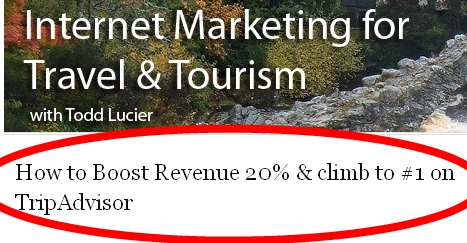

Associated Press has placed the TripAdvisor review fraud issue front and center after their recent interview with me. With that bold step, the subject has gone from the cloaked domain of travel writers into open public view. Kudos to AP.
What is TripAdvisor doing now that they’ve openly admitted to reviewer fraud?
I spoke this week with April Robb at TripAdvisor. We discussed the issue of their fraud warning flags which they posted on properties with allegedly fake reviews. I asked her to explain why many of them had been removed.
Robb said, “…the flags are ongoing,” and that once posted on a property, “are timed to expire based on the nature of the infraction and the steps taken to correct it.”
I talked with the owner of one of the hotels that had their TripAdvisor warning flag removed, and he confirmed Robb’s comment. He also indicated that no agreement had been reached with TripAdvisor in order to have the warning lifted.
My point of view: Vague, pat answers serve no one.
The removal of a majority of the warning flags, done without a broader explanation of TripAdvisor’s fraud prevention initiatives, continues to raise more questions rather than assuage our very real concerns.
TripAdvisor’s lack of candor and transparency regarding review fraud and specifically what they are doing about it, further undermines the credibility of an otherwise most valuable resource.
When I questioned TripAdvisor about this directly in my discussion with Robb, I received no answer beyond this:
“TripAdvisor does not disclose more in order to prevent giving a road map to those would seek to manipulate our system.”
When I said that the public wants and needs to understand what is really going on in this matter, Robb told me that TripAdvisor believes they are already adequately communicating their position with the public.


TripAdvisor appears to me and others to be significantly manipulated by hoteliers, their employees and friends, and their marketing and public relations companies. If you think this isn’t true, then have a look at the above image which depicts how to increase your revenue and TripAdvisor standing. While its author didn’t suggest anything inappropriate, I believe it nonetheless speaks decidedly to the point. TripAdvisor CEO Steve Kaufer even felt it necessary to comment on the site with words of admonishment.
The bottom line is that either TripAdvisor will take the bit in its mouth and deal with fraud, via disclosure and reviewer authentication among other things, or suffer any incumbent consequences.
Thus far, unfortunately, I find the TripAdvisor attitude reminiscent of that of both IBM and Microsoft, who in their hay day felt they were beyond reproach.
Other respected points of view.
Here are just a few of the many recently expressed opinions that followed groundbreaking on the topic.
Analyst and Travel Weekly/Travolution editor and writer Dennis Schaal:
“A verification process would hurt TripAdvisor… because it would greatly reduce the number of reviews it accepts. Limiting the number of reviews on TripAdvisor would hurt its media/advertising business, which is fueling Expedia… growth, (and)… impact traffic to TripAdvisor. After all, a lot of this review integrity controversy is travel industry “inside baseball.” Much of the public doesn’t even know there is an issue.”
“(I) use TripAdvisor when I travel, but I do so with the knowledge that the travel industry is successfully manipulating the site.”
They recently joined the conversation with an article entitled “Is TripAdvisor.com one big joke?” Regarding TripAdvisor’s alleged proprietary tools with which they claim to catch fraud, they lamented:
“Proprietary automated tools.” What’s that?… This isn’t much of a defense…. TripAdvisor’s tattered reputation doesn’t involve automated spam. It involves… a human-directed stuffing of the ballot box.”
Sean O’Neill at Budget Travel:
“I’ve long wondered [why] TripAdvisor didn’t duplicate Amazon’s ‘Real Name’ feature, which offers third-party verification that a reviewer is the person he or she claims to be.” That would be a better solution than what TripAdvisor is putting forward, which is too vulnerable to human error”.
In an article entitled “Who’s really writing the reviews on TripAdvisor.”
“A dirty war has broken out with hotels and restaurants using the site to attack rivals or boost their own ratings by posting fake reviews.” A hotelier is quoted as saying, “The system is laughably easy to manipulate… I wrote every single review. I was even approached by PR firms offering to write my reviews for me. It’s not hard to cover your tracks.”
“Why wouldn’t a hotel submit a flurry of positive comments penned by employees or friends? If you were a hotel owner, wouldn’t you take steps to make sure that TripAdvisor contained numerous favorable write-ups of your property? Who would fail to do this? And because of such inescapable logic, doesn’t TripAdvisor contain within itself the germs of its own undoing?”
I look forward to hearing your input.



I was recently comparing hotels in one mainland city on TripAdvisor and suddenly recognized several of the negative reviews of competing hotels in the same writing style with graphic descriptions of fillthy rooms, baths, etc.
As disturbing as phony favorable reviews may be, the idea that a hotelier posts damaging reviews of neighboring properities is much worse. I think one solution might be for Trip Advisor to post scores but limit pro or con comments to one Tweet-length or shorter phrase. Graphic negative comments should be banned, a positive or negative score is sufficient. The ratings and rankings could still be helpful in some cases at least.
Pua, forums are much more likely to result in objective data due to the fact that you can ask a specific question and receive numerous answers, and if one answer is off the mark, other forum users will step forward and correct bad info.
Hello again Jeff,
As followers of ‘Beat of Hawaii’, we know your concern about ‘manipulated reviews’ on Tripadvisor. It looks like finally the entire issue got much more national media attention and Tripadvisor has to take its stand.
A more sophisticated ‘reviewer authentication’ does not seem to me the solution to the problem. It will just make the manipulation of the system a bit harder. Guys this is the Internet! Scammers have always found and will find their way around ‘road-blocks’!
What makes Colleen think that forums are less likely to provide her with the absolute 100% objective feedback, I don’t know, plus remember with all the feedbacks, even the non-manipulated ones, travelers’ subjective opinions about a hotel or a vacation rental vary big time from one another.
However, I know it feels good to read lots of good stuff about a hotel you intend to book…
Aloha Pua
Best Hawaii Vacation Blog
I agree with Colleen, I use the forums instead of the reviews. I find them very valuable. And the user photos tell the “real” story.
I recently noticed a hotel in a city we were planning to visit was voted #1 over A BRAND NEW Hotel with flat screen TV’s, etc. I also noticed that the last couple of dozen reviews were left by people who had no ‘history’ with TripAdvisor – telling me that they were ‘fake’.
I contacted TripAdvisor about – suggesting they look into this particular hotel – and here is their response:
**We take accusations of review fraud very seriously and remain vigilant in order to prevent all instances from appearing on TripAdvisor. We’re constantly refining our automatic filters and editorial training based on feedback like yours, so we very much appreciate hearing from you.**
I watched the same hotel reviews and in a week or so the hotel I reported had moved to #2 – not exactly what I expected. There was never a flag placed on this particular hotel to warn of possible fraud – which I still believe occured.
Basically, I have moved from using the reviews to using the forums. That way you can get info from real people – I have also contacted numerous folks personally via the site and feel I have gotten reliable info that way.
I no longer totally trust the reviews – but, I will check out user photos.
Thanks, Colleen, Shabingie, Pua and Roger.
Good input.
Aloha, Jeff